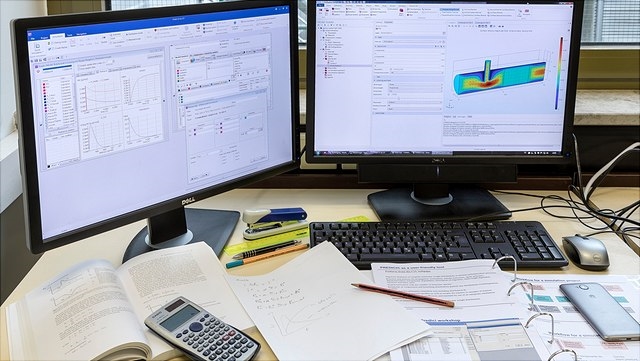Modeling & Chemical kinetics
Polymers have been an integral part of everyday life for some time now. They have established themselves in many areas as an integral part of our lives and our environment. For example, (co-)polymers are being used with growing success in the pharmaceutical, cosmetics, detergent and construction industries, among others. High-quality copolymers are needed for the building materials industry and the construction industry. The improvement of the rheological properties of concrete, bentonite or well cement is in demand, and therefore, a direct increase of the quality of these products is required. Their addition to concrete etc. or hydraulically setting mortar ensures a longer working time, better flow behaviour, higher load-bearing capacity and increased adhesion. These are, among many others, only a few properties that can be significantly improved by adding special tailor-made copolymers. In comparison to "low-molecular" chemistry, chemists have a relatively small number of basic building blocks at their disposal, in this case monomers and macromers, with which they can synthesize copolymers that exhibit the desired characteristics. The desired copolymers can only be obtained by precisely controlling the reaction conditions and the reaction control of the synthesis process. Knowledge of the copolymerization parameters is an important prerequisite for the targeted adjustment of a specific chemical composition.
Modeling of fast emulsion polymerizations
The aim is to be able to describe very fast emulsion polymerizations mathematically, and it is expected that in borderline cases, mass transport limitations of the reaction speed will occur. Furthermore, it might be possible to influence the copolymer composition by the mass transfer properties of a monomer mixture. The simulations are performed with the software programs PREDICI© and Mathematica.
Kinetic investigations of very fast, exothermic reactions and alternative reactor concepts for continuous process control of hydrolysis reactions
For a kinetic investigation of very fast exothermic reactions, it is important to determine the speed constants as well as the mixing times of the hydrolysis reactions to be examined, in order to arrive at an extended understanding of the system from the data obtained. Suitable measuring methods have to be found and tested for the time tracking of fast exothermic reactions. Furthermore, alternative reactor concepts for a continuous process control of the investigated material system are being developed.

